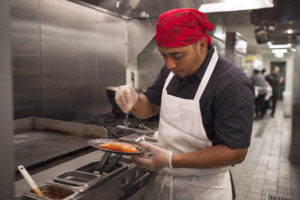Our company believes in the power of learning from each other, our industry colleagues,  and conducting our own research to better our business and our client’s businesses.
and conducting our own research to better our business and our client’s businesses.
We recently attended a team meeting for one of our longtime restaurant clients, Farmers Restaurant Group. Inspired by the award-winning restaurant food safety tips they’ve installed to meet their stringent internal standards, we asked their in-house Vice President of Quality Assurance & Purchasing, Vicki Griffith, to speak to the top food safety tips for restaurants they recommend for every restaurant business.
Sure, we’ve covered the importance of maintaining clear, workable food safety standards, but we’re delving deeper here to uncover how FRG consistently maintains their food quality & safety standards, while operating within four (yes, four!) regulatory jurisdictions: Washington, D.C.; Fairfax County, VA; Montgomery County, MD; and Montgomery County, PA.
Their constants: Following the lead set by the FDA and local health jurisdictions, as well as holding monthly inspections and assessments. Why? To take an active role in mitigating risk every day by putting these factors into play with every quality assurance and purchasing decision:
- Improper hot/cold holding temperatures of potentially hazardous food.
- Improper cooking temperatures.
- Dirty and/or contaminated utensils & equipment.
- Poor employee health & hygiene.
- Food from unsafe/unproven sources.
To put these practices in place and mitigate risk, we asked Vicki for her top 3 restaurant food safety tips to better your business:
- Handwashing. Hands down… #1. Vicki and her team cannot stress enough the importance of: a) training staff how to wash their hands properly (tip: most overlooked areas when washing hands: one’s dominant thumb & the flesh of the palm); and b) providing staff with easy access to sinks. Another great tip: scent matters. Yup, Vicki’s research shows that non-pleasant soap scents contribute to reduced handwashing. So, look for clean, soothing scents (citrus, lavender) that are not overwhelmingly fragrant.
- Cold Holding & Cooling. “ALL temperature management is essential,” says Vicki, “but these two are truly critical and mitigate the most risk.” For example, FRG uses remote sensing technology to monitor coolers and are always looking for new tools for a “smarter,” more “tech” driven kitchen. The goal here: to make this function easier on their teams and as failsafe as possible.
- Clear Mission, Direction & Commitment. “Clear direction and commitment from ownership (plus, walking the talk) help make for a great, aligned food safety system,” says Vicki. A shared belief in the importance of striving to be great at food safety is a must for successful quality assurance. FRG invests in that belief every day with Vicki and her team. “In serving approximately 2.6 million guests a year,” says Vicki, “we have to be better at what we do in our kitchens on a daily basis to inspire our teams to want to be great at food safety.” It is essential for a restaurant operation to champion a culture for safe food practices, one that is held to the highest standards and upheld with every dish that comes out of their kitchen.
*Food safety practices at work @Founding Farmers Tysons.
